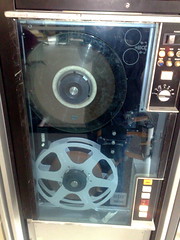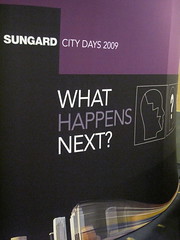 A few days ago, MusicThinkTank published this post in response to this post, pulling out the ‘headline’ that “in 2008, 1,500 releases broke the “obscurity line†(sold over 10,000 albums).”
A few days ago, MusicThinkTank published this post in response to this post, pulling out the ‘headline’ that “in 2008, 1,500 releases broke the “obscurity line†(sold over 10,000 albums).”
The context for the quote is this (it’s from some bloke who works for TommyBoy Entertainment):
“So in the whole year only 227 of the artists were artists that had broken what we call the “obscurity line.†When you sell 10,000 albums, you’re no longer an obscure artist; people know about you.”
So this is a made-up measurement – it’s what ‘we’ (no mention of who ‘we’ are), arbitrarily decided, that selling 10,000 records makes you not obscure. Why? How? Nope, nothing. Just that ‘people know about you’. Very scientific and verifiable. ‘People’.
It’s also based on ‘Soundscan’ statistics. By Soundscan’s reckoning, I’ve sold about 3% of my actual sales across my career – that’s how many have gone through the Soundscan system. Not a single one of my gig sales, my own website sales, bandcamp sales, CDbaby sales have gone through Soundscan. So this tells us that 1500 artists have reported 10K sales to Soundscan. And that’s apparently a story about obscurity?
No it’s not. Not even close:
- Are there only 1500 acts in the world playing music professionally? No. There are hundreds of thousands. Possibly millions.
- Are there only 1500 acts in the world making awesome music, and continuing to be able to make awesome music? No. There are tens of thousands for each of us. And tastes differs so much around the world. There are millions of artists that are awesome to someone and keep being awesome to someone.
- How many outlets are there for music that don’t report to Soundscan? Thousands.
- Where do most indie artists make the vast majority of their sales? Their gigs, then their own website.
- So just how specious is it to whack a label as pejorative as ‘the obscurity line‘ onto a statistic that just proves itself to be utterly meaningless if you, y’know, listen to music because you love it rather than make money from ‘breaking artists’.
So, the whole notion of an ‘obscurity line‘ is so bogus as to hardly be worth responding to.
If the figure here is that only 1500 reported more than 10,000 album sales to Soundscan, the REAL story is the hundreds of thousands of bands who make awesome music and are able to keep making awesome music without selling that many records through the mainstream. The old industry. The ‘established path’. That it’s quite possible to have a sustainable, successful, fulfilling, enjoyable, liberated, creative career in music without selling 10K ‘albums’ a year through those outlets. That, my friends, is proper awesome!
So why ‘Obscurity’?
Obscurity is an utterly meaningless word in this context – obscure to who? Where? Obscure meaning unheard of?
There are a lot of artists in the world who are known to millions but couldn’t sell 10K copies of a new album if they released one. Not obscure, but certainly not ‘current’.
And there are others who are selling hundreds of thousands of records, and feel like abject failures because their label promised them more and spent as though they were going to sell millions. (in the same article, the TommyBoy bloke says that of the 112 albums that sold more than 250K, HALF DIDN’T BREAK EVEN! What industry, after 50 years of experimenting, of statistics or measuring trends, or gauging audience reaction, still can’t make money on a product that sells 250,000 units?? A broken, insane industry, that’s what.)
All these two statistics prove is that some people still equate industry success with ‘gross’ figures rather than ‘net’ figures. Gimme a 300 grand marketing budget and I could fairly easily sell 20K+ albums in a year. The problem would be that that would only gross, at best, 200 grand. Net would be a lot lower. So I’d be selling WAY more records than I am now, would no longer be ‘obscure‘ (ha!) but I’d be a failure in every other sense because I’d be a hundred grand in debt, and my self esteem would be shot. Or if someone else paid for it, I’d be beholden to them for what happens next to try and get that 100K back.
Forget obscurity metrics and think about what matters – making the music you love, finding the people who share that passion, and not killing yourself with unrealistic expectations of how much money it’s going to make you.
Here’s a suggestion – 10,000 listeners is a much more creatively inspiring target than 10,000 sales. How would you get 10K listeners without spending a penny, OR worrying about earning anything. Cos 10,000 listeners and no money is a really great problem to have to try and solve… Answers in the comments 🙂



 I have a friend who works in Marketing for
I have a friend who works in Marketing for